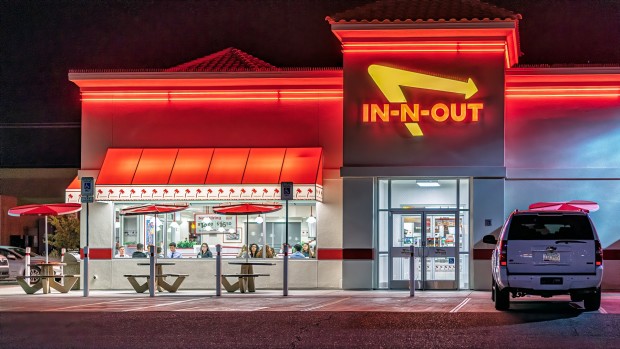
In-N-Out Burger has a cult-like following. The West Coast chain has a devoted customer base that sings its praises and makes every new store opening an event.
When In-N-Out adds a new market, people line up for hours to get some of its signature burgers and fries. One of the first fast-food restaurants to have a widely known "secret" menu, the chain has created a sort of "if you know, you know" culture where its customers serve as its marketing arm.
DON'T MISS: Bud Light 'Woke' War Isn't Just About Kid Rock, Garth Brooks
On the positive side, In-N-Out also has a strong reputation as being a good employer. It pays above-average wages and generally has less turnover than what has been traditional in the fast-food space.
The chain, however, has not been without its controversies. It ran afoul of California law during the covid pandemic when it refused to check customers' vaccine cards (which was the law in parts of the state.) It has also had a questionable history with LGBTQ+ customers with its founders making political donations that support candidates who have not been supportive of that community.
Now, a new policy the chain appears to have enacted puts it at odds with health officials once again.

Image source: Shutterstock
In-N-Out Makes a Controversial Choice
During the pandemic, In-N-Out clashed with California law because the chain's leadership did not believe that a private business should have to act as the "vaccine police." That might be a controversial position, but it's one that people on both sides of the argument can likely understand.
Mask-wearing during the pandemic was also a controversial thing. Right-leaning voters tended to be against mask mandates saying wearing a mask or not was a "personal choice" while left-leaning voters tended to support mask mandates for the "greater good."
And while there were some outlier businesses that tried to ban mask-wearing, most people -- no matter their political persuasion were not against voluntary mask-wearing. People may not have been wanted to be forced to wear a mask, but many liked having the choice if they were in a crowded place (to protect themselves) or if they felt they might be coming down with something (to protect others).
Now, according to a Tweet from molecular biologist Dr. Lucky Tran, who writes regularly about public health issues for a number of outlets, shares a document from In-N-Out that bans employees from wearing masks while working unless they get a specific medical exception.
ALSO READ:
- Man Impersonates TSA Agents at Different Airports in Totally Epic Performanc
- 'Fake' McDonald's in LA Serves a Pretty Interesting Purpose
In-N-Out Bans Employees From Wearing Masks
In-N-Out did not respond to a request to comment on its mask policy filed on July 14 through its media contact page. The policy, which Tran shared on his Twitter page frames the decision as being about customer service.
"We are introducing new mask guidelines that emphasize the importance of customer service and the ability to show our Associates smiles and other facial features while considering the health and wellbeing of all individuals," the company shared in what Tran says is an internal document. "We believe this policy will also help to promote clear and effective communication both with our Customers and among our Associates."
The policy bans employees from wearing masks unless the worker has a "valid medical note." Employees who don't comply will face discipline which could include termination. The In-N-Out document is addressed to Arizona, Colorado, Nevada, Texas, and Utah employees. California and Oregon, the other two states where the company operates, appear to not be included.
Tran provided emails and other evidence to show that the policy is real and will go into effect on Aug. 14.
The Centers for Disease Control (CDC) considers mask-wearing a valid strategy to prevent the spread of airborne diseases.
"Layered prevention strategies -- like staying up to date on vaccines and wearing masks -- can help prevent severe illness and reduce the potential for strain on the healthcare system," the federal agency shares on its website.
Even the Florida Department of Health has recommended that food service workers consider wearing masks as a voluntary safety measure.
"Use Personal Protective Equipment (PPE) such as face masks, gloves, aprons, shoe coverings, or goggles, if needed," the agency shared on a page titled "Best Practices for Food Service Workers."







